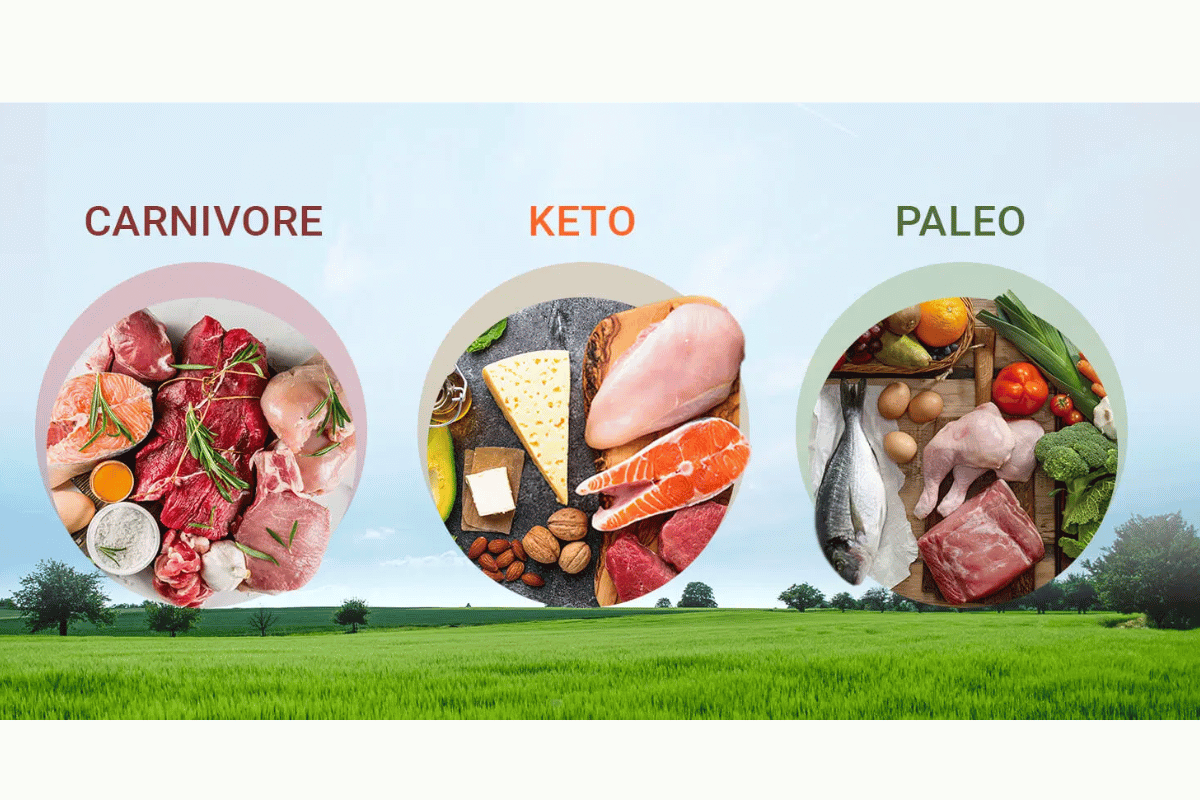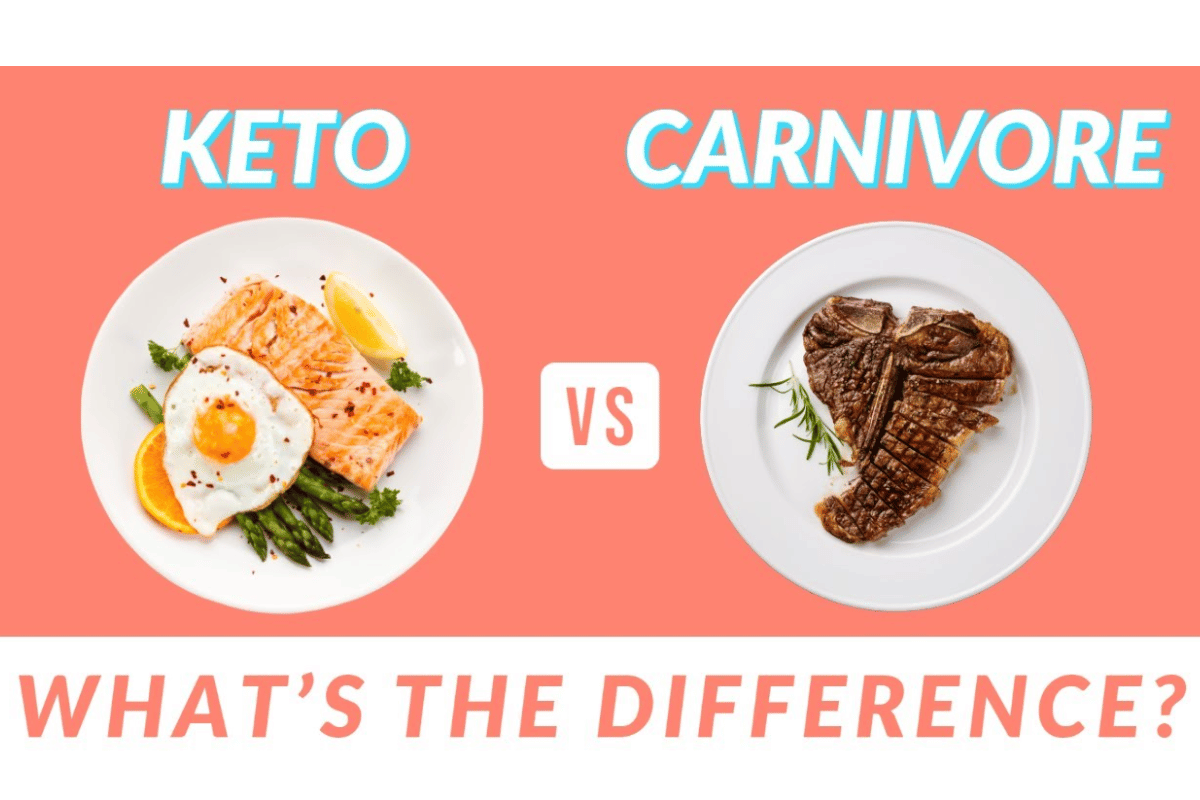As we venture into 2024, the debate between the keto diet and the carnivore diet continues to captivate health enthusiasts and those seeking weight loss solutions. The keto diet, known for its low-carb, high-fat approach, has been a popular choice for many looking to shed pounds and improve their overall health. On the other hand, the carnivore diet, with its all-meat protocol, has emerged as a controversial yet intriguing option for those exploring alternative dietary lifestyles.
This comprehensive comparison aims to dissect and understand these two diets, delving into their principles, benefits, and potential drawbacks. The keto diet, with its ability to induce ketosis, has been praised for effective weight loss and health benefits, while the carnivore diet claims to offer simplicity and potential health improvements through an all-meat regimen.
The rising popularity of both diets raises important questions about their effectiveness, nutritional adequacy, and long-term health impacts. In this article, we’ll explore key aspects such as their nutritional profiles, impact on weight loss, long-term health effects, suitability for different lifestyles, ease of adoption, and adaptability to various health goals.

Our goal is to provide an unbiased and informative analysis, enriched with expert opinions and scientific studies, to help readers make informed decisions about the keto diet vs carnivore diet. This exploration is not just about choosing a diet; it’s about understanding how these dietary choices can align with individual health needs and lifestyle preferences in 2024.
Understanding the Keto Diet
The keto diet stands as a significant dietary movement, especially in the context of weight loss and health optimization. At its core, the ketogenic diet revolves around high fat, moderate protein, and very low carbohydrate intake. This macronutrient ratio shifts the body’s metabolism from using glucose as its primary fuel source to burning fats, leading to a state known as ketosis.
Key to the keto diet are foods like avocados, cheese, nuts, fatty fish, and oils, while it largely excludes high-carb foods such as grains, sugars, fruits, and starchy vegetables. The emphasis is on healthy fats, which constitute about 70-80% of the daily caloric intake. Proteins are essential but not in excess, to prevent the body from converting them to glucose, which could interrupt ketosis.
The health benefits of the keto diet are notable, particularly in the context of weight loss, improved blood sugar levels, and enhanced brain function. It’s praised for its ability to reduce insulin levels and inflammation, making it a potential diet choice for those with diabetes or metabolic syndrome. However, it also comes with considerations such as the need for careful management to ensure nutritional adequacy and potential side effects like the keto flu during the initial adaptation phase.
Thus, the keto diet presents a fascinating approach to nutrition and weight management, one that requires a comprehensive understanding and mindful implementation to harness its full potential for health and well-being.
Understanding the Carnivore Diet
The carnivore diet, a relatively recent addition to the dietary landscape, takes an unconventional approach by advocating for an all-meat regimen. This diet primarily consists of animal products like meat, fish, eggs, and sometimes dairy, completely excluding plant-based foods. Its philosophy hinges on the belief that human bodies are better adapted to consume animal products and that many plant foods may not be necessary or even potentially harmful.
At the heart of the carnivore diet is the consumption of high amounts of protein and fats, with virtually zero carbohydrates. This approach is said to offer various health benefits, including weight loss, reduced inflammation, and improved digestive health. Proponents often cite improvements in energy levels, mental clarity, and alleviation of autoimmune symptoms.
However, the carnivore diet is not without its controversies and potential risks. Critics point out the lack of essential nutrients found in plant foods, such as fiber, vitamins, and minerals. There’s also a debate over the long-term implications of such a diet on heart health, given its high saturated fat content.
In summary, the carnivore diet presents a radical shift from traditional dietary patterns, focusing on animal products to the exclusion of plant-based foods. Understanding this diet requires an exploration of its principles, potential benefits, and the controversies surrounding its impact on health and nutrition.
Comparative Analysis #1: Nutritional Profiles
When comparing the keto diet and the carnivore diet, it’s essential to examine their nutritional profiles to understand how each meets daily nutritional needs. Both diets are low in carbohydrates, but they differ significantly in their approach to fats, proteins, and micronutrients.
The keto diet emphasizes a high intake of fats, moderate proteins, and minimal carbohydrates. This macronutrient distribution is designed to maintain ketosis, a metabolic state in which the body burns fat for fuel. The diet includes a variety of foods such as leafy greens, nuts, seeds, and healthy oils, which provide essential vitamins and minerals. It’s particularly rich in nutrients like Vitamin A, Vitamin C, potassium, and magnesium, primarily sourced from low-carb vegetables and dairy products.
On the other hand, the carnivore diet is almost exclusively focused on animal products, providing a high intake of protein and fats but with an almost complete absence of carbohydrates. While this diet is rich in certain nutrients like Vitamin B12, iron, and zinc, predominantly found in meat and animal organs, it lacks other vital nutrients commonly found in plant foods. The absence of fruits and vegetables raises concerns about deficiencies in vitamins like Vitamin C and fiber.
In terms of macronutrient ratios, the keto diet offers more versatility with a balance of fats, proteins, and some carbohydrates, while the carnivore diet is more restrictive, focusing mainly on protein and fat, with very few carbohydrates.
In summary, while both the keto diet and the carnivore diet restrict carbohydrates, they differ significantly in their overall nutritional profiles, with the keto diet offering a broader range of nutrients from various food groups, whereas the carnivore diet is more narrowly focused on nutrients available from animal sources.
Comparative Analysis #2: Impact on Weight Loss
The impact on weight loss is a pivotal aspect of the comparison between the keto diet and the carnivore diet. Both diets have gained attention for their potential to aid in significant weight reduction, but they achieve this in different ways.
The keto diet, with its high-fat, moderate-protein, and low-carb profile, works by putting the body into ketosis. This metabolic state leads to efficient fat burning for energy, resulting in weight loss. The diet’s ability to reduce appetite is another key factor, as the high fat and protein content promote satiety, potentially leading to a lower calorie intake. Studies have shown that the keto diet can lead to significant weight loss, especially in the short term, and can also improve factors like blood sugar levels and triglycerides.
In contrast, the carnivore diet promotes weight loss primarily through its high protein content. Protein has a high thermogenic effect, meaning its digestion burns more calories, and it also helps in building and maintaining muscle mass, which in turn boosts metabolism. The carnivore diet’s simplicity in food choices can also inadvertently lead to a reduction in calorie intake, as the options are more limited compared to a typical balanced diet.
In summary, while both the keto diet and the carnivore diet can be effective for weight loss, they operate through different mechanisms. The keto diet’s focus on fat and ketosis and the carnivore diet’s high protein intake offer distinct pathways to weight reduction. This comparison provides insight into how each diet might suit individual weight loss goals and dietary preferences.
keto diet vs carnivore diet
Comparative Analysis #3: Long-term Health Effects
Evaluating the long-term health effects of the keto diet and the carnivore diet is crucial in understanding their overall impact on wellness. Both diets have distinct characteristics that influence various health aspects, particularly concerning heart health, cholesterol levels, and the risk of chronic diseases.
The keto diet, known for its high-fat content, raises questions about its long-term effects on heart health. However, research suggests that the type of fat consumed is key. The diet encourages the intake of healthy fats, like those from avocados and nuts, which can positively affect cholesterol levels by increasing HDL (good cholesterol) and reducing LDL (bad cholesterol). The diet’s impact on weight loss and blood sugar control also contributes positively to cardiovascular health. However, it’s important to monitor dietary choices to ensure heart health is not compromised over time.
Conversely, the carnivore diet predominantly consists of animal products, which are high in saturated fats and cholesterol. While some studies suggest that this diet can lead to improvements in blood lipid profiles, others raise concerns about the potential increase in the risk of heart disease due to the high intake of red and processed meats. The lack of dietary fiber, typically found in plant-based foods, is another point of consideration, as fiber plays a significant role in heart health.
In summary, the keto diet and the carnivore diet each have unique implications for long-term health. While the keto diet can offer benefits for heart health and cholesterol control when properly managed, the carnivore diet’s high saturated fat content and lack of fiber present potential risks that need to be carefully considered. This comparative analysis provides valuable insights for individuals considering these diets for long-term health and lifestyle choices.
Comparative Analysis #4: Suitability for Different Lifestyles
When considering the keto diet and the carnivore diet, it’s important to assess their suitability for different lifestyles, including those of athletes, individuals with sedentary lifestyles, and people with specific dietary restrictions or health conditions.
For athletes, the keto diet offers a unique advantage due to its ability to enhance fat utilization and preserve glycogen stores, potentially benefiting endurance sports. However, athletes engaging in high-intensity sports might find the lower carbohydrate intake restrictive and may need to adjust their diet to include more carbs for optimal performance.
In contrast, the carnivore diet might appeal to athletes focusing on strength and muscle building due to its high protein content, which is essential for muscle repair and growth. Yet, the lack of carbohydrates could be a downside for those requiring quick energy bursts and glycogen replenishment.
For individuals with a sedentary lifestyle, the keto diet can be beneficial due to its ability to promote weight loss and improve metabolic health, even with lower levels of physical activity. However, the carnivore diet might be challenging for this group due to its high protein and fat content, which might be excessive without regular physical activity to utilize these macronutrients effectively.
Those with specific dietary restrictions or health conditions also need to consider these diets carefully. The keto diet offers more flexibility in food choices and can be adapted for people with allergies or intolerances to certain food groups. However, the carnivore diet, with its strict focus on animal products, may not be suitable for individuals with conditions like hypercholesterolemia or certain types of kidney diseases.
In summary, both the keto diet and the carnivore diet have their advantages and limitations, depending on an individual’s lifestyle, physical activity level, and health status. This analysis provides a nuanced understanding of how each diet can be tailored to fit various lifestyle needs and preferences.

Comparative Analysis #5: Ease of Adoption and Sustainability
The ease of adopting and sustaining the keto diet versus the carnivore diet is a critical factor to consider when choosing a dietary lifestyle. Both diets require significant shifts from conventional eating patterns, but they vary in terms of accessibility, meal preparation complexity, and long-term sustainability.
The keto diet offers a relatively diverse range of food options, including meats, fats, low-carb vegetables, nuts, and seeds. This variety can make the diet more palatable and easier to integrate into different culinary traditions and social settings. However, the need for careful macronutrient tracking and the initial transition phase, often marked by the keto flu, can be challenging for some individuals.
In contrast, the carnivore diet is simpler in terms of food selection, as it primarily consists of animal products like meat, fish, and eggs. This simplicity can make meal planning and preparation less time-consuming. However, the diet’s restrictive nature might lead to social and cultural challenges, particularly in settings where plant-based foods are a staple. Additionally, the lack of variety could potentially impact long-term adherence and satisfaction.
In summary, while the keto diet offers greater variety and flexibility, which may aid in longer-term adherence and social integration, the carnivore diet scores high on simplicity and ease of meal preparation. The choice between these diets depends on individual preferences, lifestyle, and the ability to sustain dietary changes over the long term. This analysis helps in understanding the practical considerations that come with adopting either diet as a lifestyle choice.
Comparative Analysis #6: Adaptability to Different Health Goals
The adaptability of the keto diet and the carnivore diet to meet various health goals is a crucial aspect of their comparison. Each diet offers unique benefits that can be tailored to specific objectives, such as muscle building, endurance enhancement, diabetes management, or improved cognitive function.
For muscle building, the carnivore diet has an edge due to its high protein content, essential for muscle repair and growth. This diet can be particularly beneficial for individuals looking to increase muscle mass and strength. However, the lack of carbohydrates might require adjustments for those needing quick energy for high-intensity workouts.
In contrast, the keto diet is well-suited for endurance athletes. By relying on fat for energy, it can help enhance endurance and stamina, as fat provides a more sustained energy source than carbohydrates. This makes the keto diet a potential choice for long-distance runners, cyclists, and other endurance athletes.
For individuals with diabetes or at risk of metabolic syndrome, the keto diet offers clear advantages. Its low carbohydrate content helps in regulating blood sugar levels and improving insulin sensitivity. This can be a significant benefit for diabetes management and prevention.
Regarding cognitive function, both diets have potential benefits. The keto diet is known for its neuroprotective properties, potentially enhancing brain function and offering protection against neurodegenerative diseases. The carnivore diet, with its focus on high-quality animal fats, can also support brain health, although the evidence is more anecdotal.
In summary, both the keto diet and the carnivore diet can be adapted to various health objectives, but their suitability depends on individual goals and needs. The keto diet’s versatility makes it suitable for a broader range of goals, from endurance sports to diabetes management, while the carnivore diet’s high protein content is particularly beneficial for muscle building and strength.

Conclusion
In this comprehensive exploration of the keto diet vs carnivore diet, we have delved into various aspects to understand their impacts and benefits. Each diet presents unique attributes and challenges, making them suitable for different individuals and health goals.
The keto diet, with its emphasis on high fats, moderate proteins, and low carbohydrates, offers a versatile approach to weight loss, improved metabolic health, and enhanced endurance. Its adaptability to various lifestyles and health goals, from managing diabetes to supporting cognitive function, makes it a compelling choice for a broad audience.
On the other hand, the carnivore diet stands out for its simplicity and high protein content, appealing to those focusing on muscle building and straightforward meal planning. However, its restrictive nature and potential long-term health impacts require careful consideration, particularly for individuals with specific health conditions or dietary preferences.
Both diets have shown effectiveness in weight loss, but their long-term sustainability and health effects vary. The keto diet offers more nutritional variety, which can be beneficial for long-term adherence and overall health. The carnivore diet, while simpler, may pose challenges in nutritional balance and social adaptability.
In conclusion, choosing between the keto diet and the carnivore diet in 2024 depends on individual health goals, lifestyle preferences, and nutritional needs. It’s crucial to consider personal health conditions, consult with healthcare professionals, and choose a diet that not only aligns with weight loss goals but also supports overall health and well-being. This analysis aims to provide readers with a balanced view, empowering them to make informed decisions about their dietary choices.
keto diet vs carnivore diet
FAQ: Keto Diet vs Carnivore Diet
Q1: What are the key differences between the keto diet and the carnivore diet?
A1: The key differences lie in their food choices and macronutrient profiles. The keto diet focuses on high fats, moderate proteins, and low carbohydrates, including a variety of foods like meats, fats, low-carb vegetables, and nuts. The carnivore diet is more restrictive, emphasizing only animal products like meat, fish, and eggs, and excludes carbohydrates entirely.
Q2: Can both the keto and carnivore diets aid in weight loss?
A2: Yes, both diets can be effective for weight loss. The keto diet aids weight loss through ketosis, which burns fat for energy, while the carnivore diet relies on high protein intake and its thermogenic effect for weight reduction.
Q3: Are these diets suitable for athletes?
A3: Suitability varies based on the athlete’s sport. The keto diet may benefit endurance athletes due to its fat-based energy utilization, while the carnivore diet could be better for athletes focusing on strength and muscle building, thanks to its high protein content.
Q4: How do the keto and carnivore diets impact long-term health?
A4: The keto diet can positively affect heart health and blood sugar levels when managed properly. The carnivore diet‘s long-term effects are less clear, with potential concerns about heart health due to high saturated fat and cholesterol intake.
Q5: Which diet is easier to sustain in the long run?
A5: The keto diet may be easier to sustain due to its variety and flexibility in food options. The carnivore diet, while simpler in terms of food choices, might be challenging to maintain over the long term due to its restrictive nature.
Q6: Can these diets be adapted for specific health goals?
A6: Yes. The keto diet is adaptable for various health goals like endurance enhancement and diabetes management. The carnivore diet is particularly suited for goals centered around muscle building and strength.
Q7: Is the keto diet suitable for people with diabetes?
A7: The keto diet can be suitable for people with diabetes as it helps in regulating blood sugar levels and improving insulin sensitivity, but it should be followed under medical supervision.
Q8: What are the potential risks of the carnivore diet?
A8: Potential risks include nutritional deficiencies due to the absence of plant-based foods and the potential increase in the risk of heart disease from high intake of saturated fats.
Q9: How do these diets affect mental and cognitive health?
A9: The keto diet is known for its neuroprotective properties, potentially enhancing cognitive function. The effects of the carnivore diet on cognitive health are less studied, though its high-fat content may also support brain health.
Q10: Should individuals consult with healthcare professionals before starting these diets?
A10: Yes, it’s crucial to consult with healthcare professionals before starting the keto diet or the carnivore diet, especially for individuals with existing health conditions, to ensure the diet is safe and appropriate for their specific health needs.
